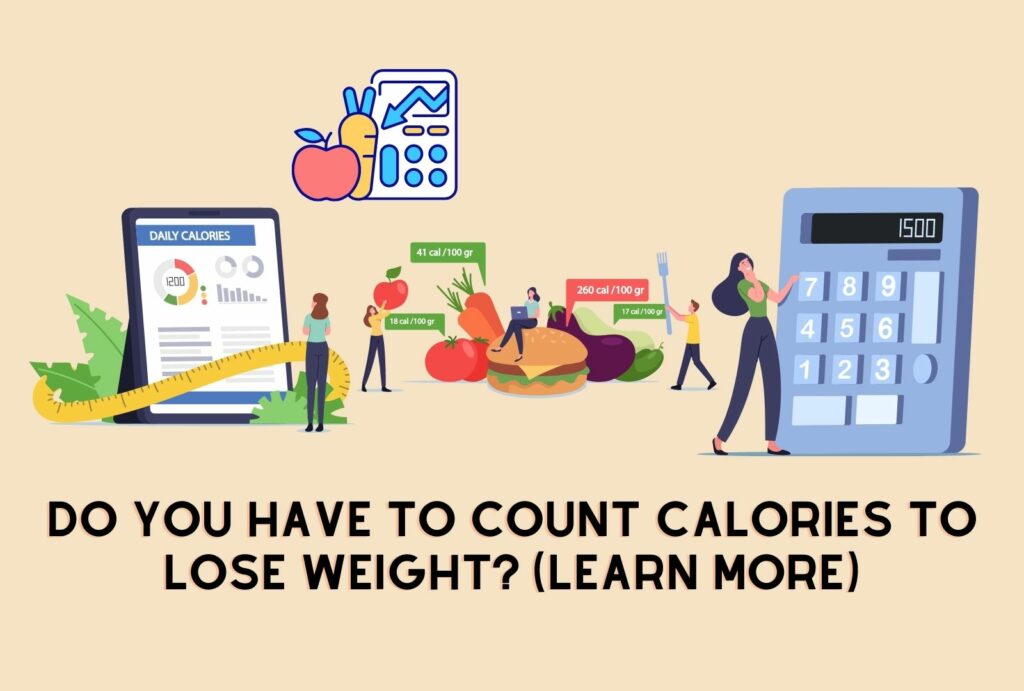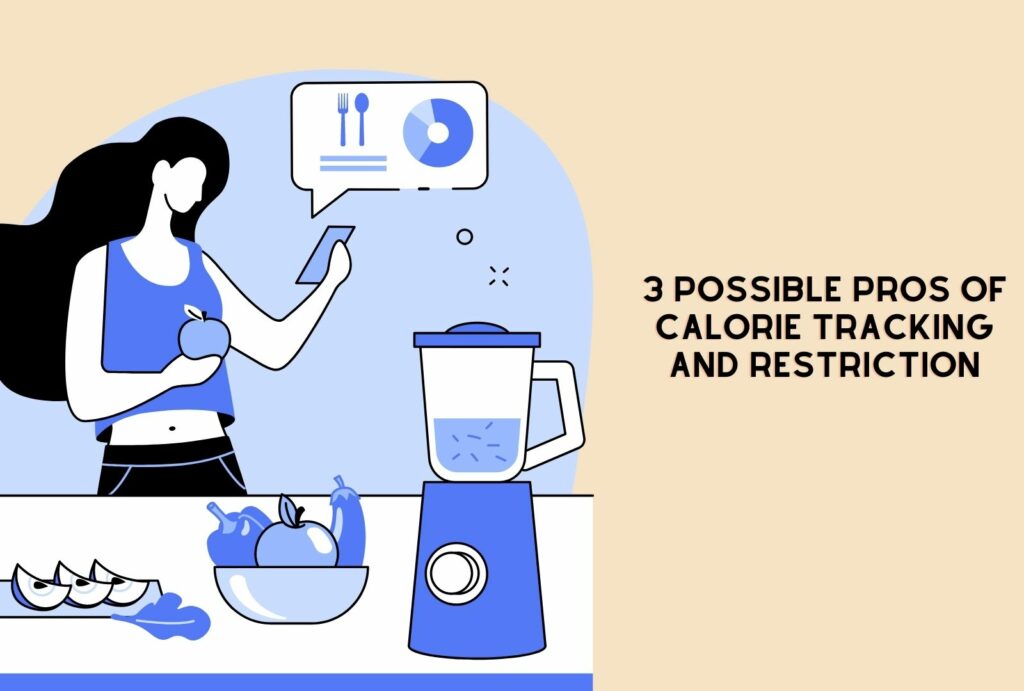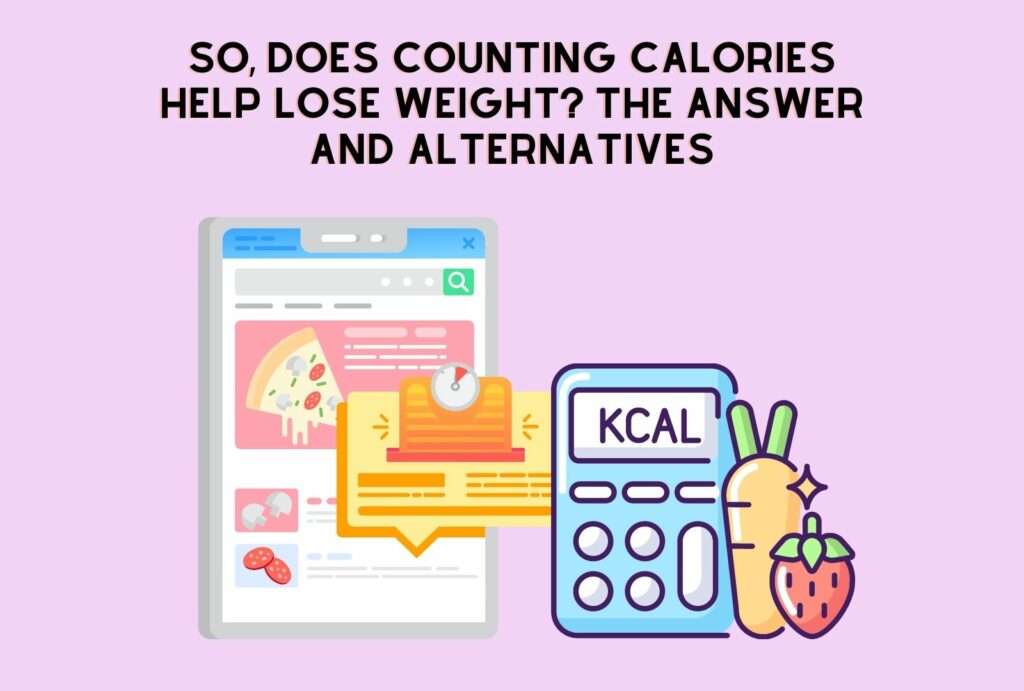
Counting calories to lose weight is a popular and often recommended approach to weight loss. The idea behind it is that by monitoring the number of calories you consume and ensuring that you’re burning more calories than you’re taking in, you’ll create a calorie deficit that leads to weight loss. However, while this approach can be effective, it’s not the only way to lose weight.
Unprocessed foods
One alternative to counting calories to lose weight is to focus on eating whole, unprocessed foods. By prioritizing nutrient-dense foods like fruits, vegetables, lean proteins, and whole grains, you can naturally reduce your calorie intake without ever having to count a single calorie. These types of foods tend to be more filling and satisfying than processed or junk foods, which can help you consume fewer calories without feeling hungry or deprived.
Body’s hunger and fullness cues
Another approach to weight loss that doesn’t involve counting calories is to pay attention to your body’s hunger and fullness cues. When you eat slowly and mindfully, you’re more likely to recognize when you’re satisfied and stop eating before you’ve consumed too many calories. This can be a more sustainable approach to weight loss since it focuses on developing healthy eating habits that you can maintain over the long term.
Of course, for some people, counting calories to lose weight can be an effective strategy. If you’re someone who enjoys tracking data and numbers, or if you’ve tried other approaches to weight loss without success, counting calories may be a useful tool for you. Additionally, for people with certain medical conditions or specific weight loss goals, such as bodybuilding or preparing for a competition, counting calories may be necessary to ensure that they’re meeting their nutritional needs.
In conclusion, counting calories to lose weight is one approach to weight loss that can be effective for some people. However, it’s not the only way to achieve your weight loss goals. By focusing on whole, unprocessed foods, listening to your body’s hunger and fullness cues, and developing healthy eating habits, you can lose weight without ever having to count a single calorie. Ultimately, the best approach to weight loss is one that you can maintain over the long term and that supports your overall health and wellbeing.
Are calories accurate?
Counting calories to lose weight has become a popular approach to weight loss. The concept is simple: create a calorie deficit by consuming fewer calories than you burn. However, to accurately count calories, you need to know the calorie content of the foods you’re consuming. But are the calorie counts on food labels and in calorie-tracking apps really accurate?
Calorie-tracking apps may not be entirely accurate
One issue with counting calories to lose weight is that the calorie content listed on food labels and in calorie-tracking apps may not be entirely accurate. Studies have shown that there can be significant variations in the calorie content of foods, depending on factors such as the cooking method, processing, and even the brand. Additionally, people tend to underestimate the number of calories they consume, so relying solely on food labels and calorie-tracking apps may not give an accurate representation of your calorie intake.
The thermic effect of food
Another factor that can impact the accuracy of calorie counting is the thermic effect of food. This is the amount of energy your body uses to digest, absorb, and metabolize the food you eat. Not all calories are created equal, and some foods require more energy to digest than others. For example, protein has a higher thermic effect than carbohydrates or fats, which means that your body burns more calories digesting protein than it does digesting other macronutrients.
It’s also important to keep in mind that calorie counting doesn’t take into account the quality of the food you’re consuming. Eating 1,500 calories of junk food is not the same as eating 1,500 calories of whole, nutrient-dense foods. While calorie counting can be an effective approach to weight loss, it’s important to also focus on consuming a variety of foods that provide the nutrients your body needs to function optimally.
In conclusion, counting calories to lose weight can be an effective approach to weight loss, but it’s not always accurate. The calorie content listed on food labels and in calorie-tracking apps may not be entirely reliable, and there are other factors that can impact the accuracy of calorie counting, such as the thermic effect of food. Additionally, calorie counting doesn’t take into account the quality of the food you’re consuming, which is an important factor in overall health and wellbeing. Ultimately, the best approach to weight loss is one that takes into account both the quantity and quality of the foods you’re consuming, and that supports your overall health and wellbeing.
3 Possible pros of calorie tracking and restriction

Counting calories to lose weight is a popular approach that involves tracking the number of calories consumed and burned in order to create a calorie deficit. While there are some drawbacks to calorie tracking and restriction, there are also some potential benefits to consider. Here are three possible pros of calorie tracking and restriction:
1. Increased awareness of food choices:
One potential benefit of calorie tracking is that it can help increase awareness of the calorie content of different foods. This can be particularly useful for people who are new to healthy eating or who have difficulty understanding the impact of their food choices on their weight. By tracking calories, people can learn which foods are high in calories and which ones are more nutrient-dense, and make more informed choices about what to eat.
2. Greater control over food intake:
Calorie tracking can also provide people with a greater sense of control over their food intake. By knowing exactly how many calories they’re consuming, people can adjust their intake to reach their weight loss goals more effectively. Additionally, for people with medical conditions or specific dietary needs, calorie tracking can help ensure that they’re getting the nutrients they need while still maintaining a healthy weight.
3. Improved weight loss outcomes:
Finally, calorie tracking and restriction can lead to improved weight loss outcomes. By creating a calorie deficit, people can lose weight more effectively and sustainably than they would if they were eating without monitoring their intake. Additionally, for people who have tried other approaches to weight loss without success, calorie tracking can provide a clear, measurable way to achieve their goals.
In conclusion, while there are some drawbacks to counting calories to lose weight, there are also some potential benefits to consider. Calorie tracking can increase awareness of food choices, provide greater control over food intake, and lead to improved weight loss outcomes. However, it’s important to approach calorie tracking and restriction with caution and to ensure that you’re still getting the nutrients your body needs to function optimally. Ultimately, the best approach to weight loss is one that you can maintain over the long term and that supports your overall health and wellbeing.
4 Cons of calorie tracking
Counting calories to lose weight is a popular approach that involves tracking the number of calories consumed and burned in order to create a calorie deficit. While there are some potential benefits to calorie tracking, there are also some drawbacks to consider. Here are four cons of calorie tracking:
1. Obsessive behavior:
One of the major drawbacks of counting calories to lose weight is that it can lead to obsessive behavior around food and body image. Some people may become overly fixated on calorie counts, leading to disordered eating patterns, anxiety, and depression. For people with a history of disordered eating, calorie tracking can be particularly triggering and can lead to negative health outcomes.
2. Inaccurate tracking:
Another potential issue with calorie tracking is that it can be inaccurate. People may not accurately measure portions or may not account for certain ingredients, leading to an inaccurate representation of their calorie intake. Additionally, calorie counts listed on food labels and in tracking apps may not be entirely reliable, leading to further inaccuracies.
3. Focus on quantity over quality:
Calorie tracking can also shift the focus away from the quality of the foods people are eating and onto the quantity of calories consumed. This can lead people to prioritize low-calorie, processed foods over nutrient-dense, whole foods. While it’s important to create a calorie deficit to lose weight, it’s also important to focus on consuming a variety of foods that provide the nutrients your body needs to function optimally.
4. Unsustainable long-term approach:
Finally, calorie tracking may not be a sustainable long-term approach to weight loss. Many people find calorie tracking to be tedious and time-consuming, and it may not be practical or desirable to track calories indefinitely. Additionally, once people stop tracking their calories, they may struggle to maintain their weight loss or may regain the weight they lost.
In conclusion, while calorie tracking can be an effective approach to weight loss for some people, there are also several cons to consider. Calorie tracking can lead to obsessive behavior, inaccuracies in tracking, a focus on quantity over quality, and may not be a sustainable long-term approach. It’s important to approach calorie tracking with caution and to ensure that you’re still getting the nutrients your body needs to function optimally. Ultimately, the best approach to weight loss is one that you can maintain over the long term and that supports your overall health and wellbeing.
So, does counting calories help lose weight? The answer and alternatives

Counting calories to lose weight is a popular approach that involves tracking the number of calories consumed and burned in order to create a calorie deficit. While calorie counting can be effective for some people, it’s not the only way to achieve weight loss, and it may not be the best approach for everyone. So, does counting calories help lose weight? The answer is that it depends on the individual and their goals. Here are some alternative approaches to consider:
1. Mindful eating:
Rather than counting calories, some people find success with a mindful eating approach. Mindful eating involves paying attention to hunger cues, eating slowly, and savoring the flavors and textures of food. By tuning in to the body’s natural hunger and fullness signals, people can learn to eat in a way that supports their weight loss goals without obsessing over calorie counts.
2. Portion control:
Another alternative to calorie counting is portion control. Rather than tracking every calorie, people can focus on eating smaller portions of food to reduce their calorie intake. This approach can be particularly useful for people who struggle with overeating or who have difficulty managing their portion sizes.
3. Exercise:
Exercise can also be an effective way to create a calorie deficit and support weight loss. By increasing their physical activity, people can burn more calories without having to restrict their food intake as severely. Additionally, exercise has many other health benefits beyond weight loss, including improved cardiovascular health, increased muscle mass, and better mental health.
4. Healthy lifestyle habits:
Finally, it’s important to remember that weight loss is not just about calories in and calories out. Creating healthy lifestyle habits, such as getting enough sleep, managing stress, and staying hydrated, can also support weight loss and overall health.
In conclusion, while counting calories can be an effective approach to weight loss for some people, it’s not the only way to achieve weight loss, and it may not be the best approach for everyone. Mindful eating, portion control, exercise, and healthy lifestyle habits are all alternative approaches to consider. Ultimately, the best approach to weight loss is one that you can maintain over the long term and that supports your overall health and wellbeing.